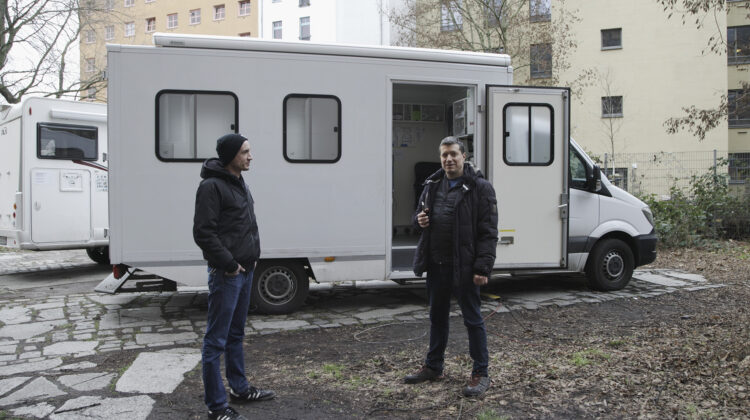A harm reduction organisation is on the frontline of helping those marginalised people who use cocaine and heroin on the streets – Read our report from Berlin and watch our short film about the drug consumption van by Fixpunkt!
“How could I speak to her, she is a drug user,” says the irritated security guard, pointing his finger at a homeless woman sitting on a bench at the metro station.
“Just how you would speak to me, or to anybody else, as a matter of fact”, responds the equally irritated social worker, a young woman.
Similar conflicts happen regularly in the Berlin underground, where an increasing number of homeless people find shelter and use crack in the cold winter.
The clash of two worlds. Security guards are tasked with removing homeless people from the metro stations. Social workers are tasked with supporting them and helping them to enter the treatment system. Conflicts are inevitable. Even if there are some overlapping aims, for example that the social workers are also interested in persuading their clients not to use the metro. Crack use is on the rise in Berlin, a consequence of the cocaine wave that hit Europe in recent years. The drug is more available than ever and has become the drug of choice for many marginalised people who try to escape the suffering of street life by getting high.
Apart from metro stations, crack users often gather in public parks, to the great annoyance of local residents. The police, responding to complaints, regularly chase them away. As a consequence, the drug scene is constantly moving – police raids only relocate it but are unable to end the problem. Just as the security guards are unable to “clear” the metro stations.
This woman, sitting on the bench, has only one leg. She unpacks her crack-use-toolkit and crawls over to her wheelchair, with practised skill. “I am off, don’t worry, ” she says, heading to the exit. The security guards move on to find the next homeless crack user. There are many more.
The author of this article witnessed this scene in the Neukölln district of Berlin at the end of January. Luckily there are some safer and more hygienic alternatives to dirty alleys and metro benches: supervised drug consumption facilities. At least for drug injectors. We were making a film about one mobile facility, operated by a local harm reduction organisation, Fixpunkt, just a few blocks from the metro station. It consists of two buses. One is the supervised consumption room itself, both for cocaine and heroin injectors. People can consume their substances in a hygienic environment, with sterile equipment – but unfortunately they cannot smoke crack yet. The other bus has room for consultations, where people can find psycho-social support, as well as HIV and hepatitis testing and counselling. They can access snacks and tea, and can find temporary refuge from a stressful, hostile street life, whilst being treated as a human being.
The main aim of the service, beyond reducing street nuisance and littering, is to reduce overdose deaths and infections. To support people in accessing other health and social services. That is, to save lives.
And the program works. We witnessed cocaine users who were chased away from the metro station to use the service, guided by social workers. Unfortunately there are only a few of these harm reduction services in Berlin – and crack smokers cannot use the mobile van. Fixpunkt would like to open consumption rooms for crack users as well in the near future. And drug use is only the tip of the iceberg: people who use crack suffer from many other things.
“You know when these people come to use, drug use is among the least of their problems,” says Sebastian, the coordinator of Fixpunkt mobile service. “They have nowhere to live, to sleep, to eat. They often have no documents, they have no access to primary health care. They are full of unprocessed trauma.”
It is not possible to “force” these people to quit drug use – if they would approach them with offers of rehabilitation, they would close up. Drug use is the best thing in their lives, even if dependence causes them problems. To recover from dependence, they would need a stable existential background and meaningful human connections. Recovery capital, as some people call it, is in short supply.
“The real source of their problems is not drug use but poverty and hopelessness,” says Sebastian. So Fixpunkt offers them support to find shelters. But one of the big problems is that there are no special shelters for people who use drugs in Berlin. There is a need for special low-threshold shelters where they are not excluded. And of course shelters are only temporary solutions: what is really needed is affordable homes. And like in many other cities of Europe, real estate prices are anything but affordable in Berlin.
Reporter and text: Péter Sárosi
Video: István Gábor Takács




